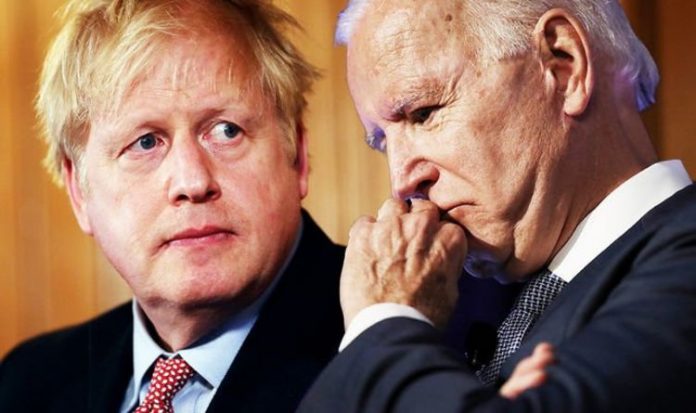Mr Biden, the Democrat Party’s candidate to be the next US President, has weighed into the controversy over the UK’s new Brexit bill. The former US Vice President warned of its complications for a future UK-US trade deal, adding to concerns among senior American politicians that changes associated with the Internal Market Bill would undermine the Good Friday Agreement. Mr Biden wrote on Twitter: “We can’t allow the Good Friday Agreement that brought peace to Northern Ireland to become a casualty of Brexit.
“Any trade deal between the US and UK must be contingent upon respect for the agreement and preventing the return of a hard border. Period.”
Unearthed reports, though, suggest Mr Biden does not fully understand the 1988 accord.
In a recent report for the Financial Times, former Work and Pensions Secretary Iain Duncan Smith explained how the Internal Market Bill actually protects the integrity of the UK and the Good Friday Agreement.
He wrote: “What critics seem to have forgotten is that the Brexit agreement makes clear that Northern Ireland is part of the UK’s customs territory. Goods should be allowed to flow between Great Britain and Northern Ireland without tariffs unless they are deemed ‘at risk’. The problem is that the ‘at risk’ category is not defined.
“This gives the EU too much discretion because it could in theory define all UK products as ‘at risk’ if it wishes and levy tariffs on all goods as they cross the Irish Sea. Such a possibility is contrary to the Act of Union that underpins Northern Ireland’s status within the UK and abolishes all customs duties between the constituent parts of the UK.”
He added: “Introducing customs duties between Great Britain and Northern Ireland would alter the constitutional status of Northern Ireland within the UK.
“In doing so, it would obviously breach the 1998 Good Friday Agreement that brought peace to Northern Ireland. That settlement states that Northern Ireland’s status cannot be changed without the consent of its people.
“Surely, if the EU didn’t intend this — and it has stated constantly that they wish to preserve the peace accord — then it has no reason to object to a UK law that blocks such a prospect.”
JUST IN: Dan Hannan on why John Major is responsible for LEAVE vote
It is not the first time a US Democrat has made such a claim regarding the Good Friday Agreement.
The Speaker of the House of Representatives Nancy Pelosi made a similar statement last week.
In April 2019, she also warned there would be no post-Brexit trade deal between the US and the UK if any “harm” came to the 1998 accord.
She said the deal “ended 700 years of conflict” and was “a model to the world”.
However, at the time, her words sparked a furious reaction from Ulster Unionist Party (UUP) peer Lord Empey – who was his party’s lead negotiator on the parts of the agreement which set up Northern Ireland’s government structures.
The peer hit out at her for her “complete misunderstanding”.
He said Congress had been “hypnotised” by the views espoused by the Irish government, which was using “the Good Friday Agreement as a tool” throughout the entire process.
DON’T MISS:
Guy Verhofstadt claimed Brexit chaos will save EU from destruction [INSIGHT]
Pelosi accused of ‘Brexit blackmail and misunderstanding 1998 accord’ [REVEALED]
Boris Johnson’s plan to override Brexit deal can lead to ‘ROYAL mess’ [ANALYSIS]
Ms Pelosi’s position, he claimed, seemed to be that the “UK should have done what the Republic’s government wanted” or forfeit a trade deal – a position Lord Empey likened to “an attempt to blackmail people”.
He also wondered where Ms Pelosi had developed her understanding of the agreement’s content.
Lord Empey told NewsLetter: “It’d be helpful if the Speaker actually spoke to some people who negotiated the agreement.
“Because some of the proposals in the withdrawal agreement – including the backstop – actually are an attack on [the 1998 deal]…
“I’ve never come across a time when there’s been so many experts on the Good Friday Agreement.
“Yet most of the people who’re spouting about it weren’t within a mile of it.”







